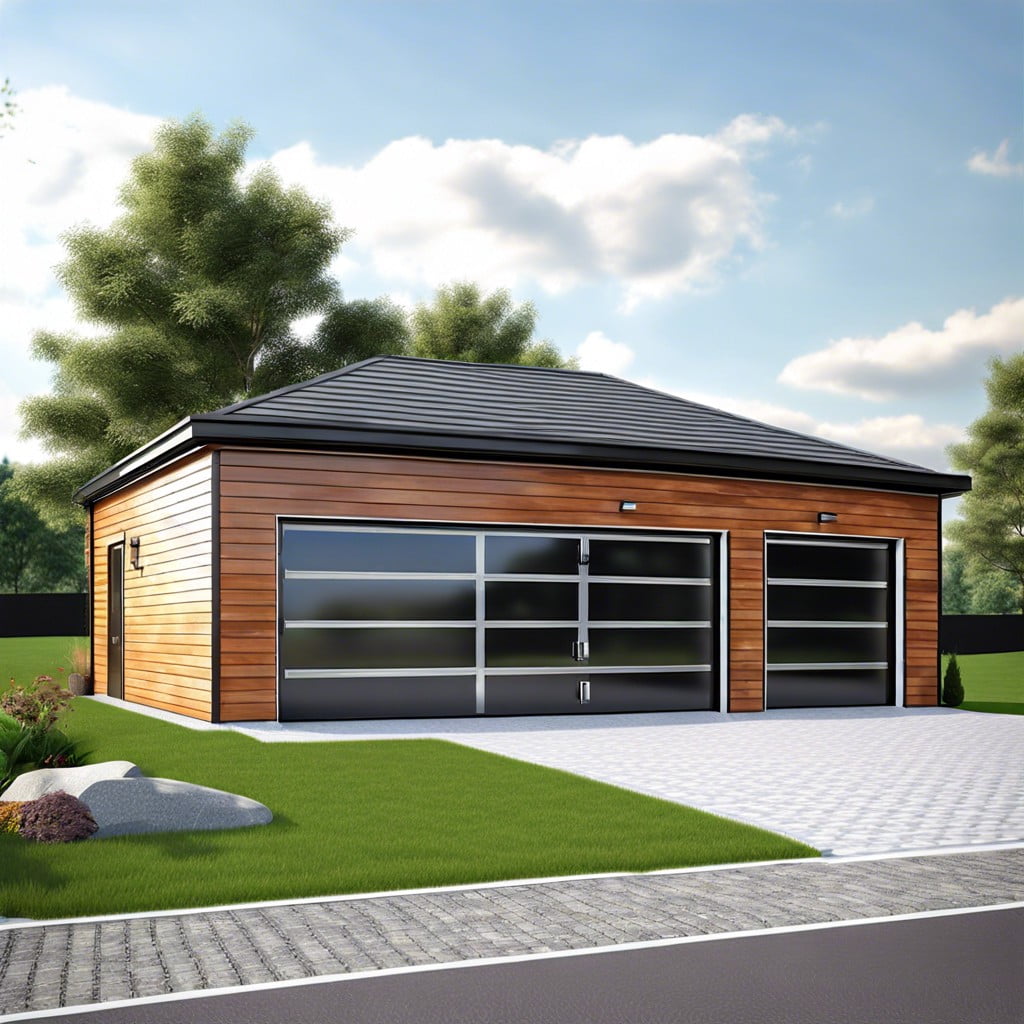Discover the key factors that influence the cost of adding a garage to your home, ensuring you’re well-prepared for this exciting update.
Key takeaways:
- Average cost: ,000-,000, influenced by size, design, and location.
- Cost per square foot: for basic, 0+ for sophisticated designs.
- Factors affecting cost: dimensions, materials, location, design complexity.
- Additional costs: permits, utilities, foundation work, insulation, roofing and siding.
- DIY vs. hiring a professional: weigh skills, patience, complexity.
Average Cost to Build a Garage

Building a garage can be a thrilling chapter in your home-improvement novel, but it comes with a price tag. On average, expect to shell out between $20,000 to $50,000. This range might make your wallet wince, but it’s influenced by the garage size, design complexity, and materials. A single-car garage leans on the lower end while a grand three-car structure topped with a loft can hit that soaring upper limit. Location plays a starring role too—building costs run higher in big cities. Factor in these points, and you can steer your garage project into a budget that doesn’t bulldoze your finances.
Garage Cost Per Square Foot
Calculating the cost per square foot provides a practical way to estimate total expenses for a garage addition. This method breaks down the budget into a more understandable figure that can directly relate to the size of the project.
For a basic garage, prices might start around $40 per square foot for a simple structure with minimal features. For those who want something more sophisticated, such as a garage with built-in storage solutions, insulation, and customized doors, costs can escalate to $100 or more per square foot.
The type of materials selected also plays a crucial role. Standard concrete blocks are generally more cost-effective than a brick veneer finish, but the latter could enhance the overall aesthetics and potentially increase property value.
Electrical installations, from basic lighting fixtures to high-end security systems, will also affect the final cost per square foot. Including these early in your planning can save you from surprises in your budget later on.
Remember, when planning, always allocate a fraction more of your budget to allow for unforeseen costs. This will help you ensure that project totals stay grounded closely to your initial calculations.
Factors That Affect the Cost of Building a Garage
The dimensions of your future garage heavily influence the overall cost—more square footage equals more materials and labor. Think of it as hosting a party; the more guests you invite (square feet), the bigger the cake (cost) you need!
Choice of materials can either save your wallet or break the bank. Opting for high-end finishes or specialty doors? That’s like buying a designer outfit for your garage—stylish but costly.
Location, location, location! Building costs vary widely depending on where you live. It’s like ordering a pizza in Manhattan versus a small town—prices aren’t the same.
Complexity of the design also ramps up the price. Adding custom features, like an apartment above the garage, is like adding extra toppings to your pizza, making it pricier but also more deluxe.
Don’t forget permits and inspections. These are the hurdles you need to jump over before starting your garage project. Depending on your area, these can either be a small step or a high jump in terms of cost and complexity.
Additional Costs to Consider
When budgeting for your garage addition, some not-so-obvious expenses can sneak up on you faster than a cat on a laser pointer. It’s worth considering:
Permits and Fees: Like a cover charge at your favorite club, your local government may require various permits to begin construction. These fees vary widely and can be a significant part of your budget.
Utilities: If you’re planning to have electricity, plumbing, or heating in your garage, prepare to pay for installation. Running utilities to a new structure isn’t always straightforward and may involve trenching or other complicated maneuvers.
Foundation Work: Depending on the type of ground you’re building on, foundation work could either be a straightforward pour or a budget-breaking endeavor involving excavation and land grading.
Insulation and Drywall: Not just for comfort but also for energy efficiency, insulating your garage and adding drywall can add to your costs, especially if you plan on heating or cooling the space.
Roofing and Siding: Match your home or go rogue? Either way, materials and labor for roofing and siding need to be factored into the overall expense.
Each of these aspects can affect the bottom line, so it’s wise to factor a little wiggle room into your budget for unexpected twists and turns during the garage-building adventure.
DIY Vs. Hiring a Professional
Deciding whether to swing the hammer yourself or let the pros take over can be a dilemma. Here’s a quick breakdown to simplify your decision:
If you’re handy, motivated, and have the necessary tools, tackling the garage addition yourself can save on labor costs and provide a great sense of achievement. Plus, you can work at your own pace, which is perfect if you enjoy long tea breaks—and who doesn’t?
On the flip side, hiring a professional can skyrocket your chances of a smoother, faster, and legally compliant project. They’ll likely dodge those pesky pitfalls that could give DIY-ers nightmares. And let’s be honest, sometimes it’s just nice to let someone else handle the stress while you critique from a lawn chair with a cold beverage in hand.
So, weigh your skills, patience, and project complexity before deciding. Remember, sometimes the cost of errors is higher than the cost of hiring expertise right from the start.